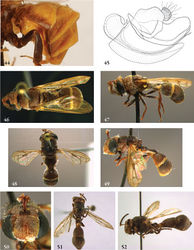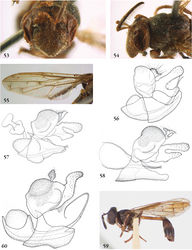Ceratrichomyia angolensis
| Notice: | This page is derived from the original publication listed below, whose author(s) should always be credited. Further contributors may edit and improve the content of this page and, consequently, need to be credited as well (see page history). Any assessment of factual correctness requires a careful review of the original article as well as of subsequent contributions.
If you are uncertain whether your planned contribution is correct or not, we suggest that you use the associated discussion page instead of editing the page directly. This page should be cited as follows (rationale):
Citation formats to copy and paste
BibTeX: @article{Reemer2013ZooKeys288, RIS/ Endnote: TY - JOUR Wikipedia/ Citizendium: <ref name="Reemer2013ZooKeys288">{{Citation See also the citation download page at the journal. |
Ordo: Diptera
Familia: Syrphidae
Genus: Ceratrichomyia
Name
Ceratrichomyia angolensis Reemer sp. n. – Wikispecies link – ZooBank link – Pensoft Profile
Type specimens
HOLOTYPE. Male. Label 1: “ANGOLA 30 km NE / Duque de Bragan - / za, Nov. / Dec. 1957”; label 2: “Collector / G.H. Heinrich”. Coll. CNC.
Diagnosis
This species differs from both other known species of Ceratrichomyia by the bare postpronotum and katepimeron, the downward projecting face, and the absence of a ventrolateral ridge on the epandrium.
Description (based on holotype)
Adult male. Body size: 10 mm.
Head. Face occupying approximately 1/2 of head width in frontal view; yellowish brown, except for blackish marks dorsally along eye margin; entirely yellow pilose; with pit-like depressions on dorsal 1/3; face profile more or less straight, strongly produced ventrally below eye margin. Gena yellowish brown. Lateral oral margins not produced. Frons and vertex yellowish brown, a little blackish at and around ocellar triangle; yellow pilose. Occiput yellow; dorsally wide and yellow pilose, ventrally narrow and whitish pilose. Eye bare. Antennal fossa about as wide as high. Antenna orange brown, except basoflagellomere blackish brown; antennal ratio approximately as 6:1:18. Basoflagellomere very long, entirely covered with pile at least as long as 1.5 times diameter of basoflagellomere. Arista very small, shorter than pedicel; situated at about 1/3 from base of basoflagellomere.
Thorax. Mesonotum dorsally black, with margins widely yellowish brown, and with pair of narrow yellow submedian vittae, dividing black into three approximately equally wide parts; short, appressed yellow pilose; transverse suture yellowish brown. Postpronotum yellowish brown; bare. Postalar callus yellowish brown; yellowish pilose. Scutellum blackish brown; yellow pilose; without calcars. Pleurae orange brown. Anepisternum with deep sulcus separating anterior and posterior part; entirely yellow pilose. Anepimeron entirely yellow pilose. Katepisternum yellow pilose dorsally and ventrally. Katepimeron bare. Katatergum with short microtrichia, anatergum bare. Calypter yellowish brown. Halter yellow.
Wing: hyaline; microtrichose, except bare on cells bc and c, basal 1/2 of cell r1, almost entirely on cells br, bm, cup and on alula, and posterobasal 1/5 of cell r4+5. Vein bm-cu shorter than basal section of CuA1.
Legs: Orange brown except femora blackish brown on basal 1/2; yellow pilose. Coxae and trochanters blackish brown; pale pilose.
Abdomen. Constricted at 2nd segment, with narrowest point at posterior margin, widest halfway of tergite 4 (slightly wider than thorax). Tergites 1-3 fused. Tergite 1 dark brown; yellow pilose. Tergite 2 pale yellow; yellow pilose along lateral margin. Tergites 3 and 4 dark brown; yellow pilose. Sternite 1 yellow; bare. Sternite 2 yellow anteriorly, brown posteriorly; mixed yellow and black pilose. Sternite 3 dark brown; black pilose. Sternite 4 concealed behind genital capsule; brown; yellow pilose. Genitalia as in Fig. 56.
Female unknown.
Etymology
The specific epithet (adjective) is derived from Angola, where the species was found.
Original Description
- Reemer, M; Ståhls, G; 2013: Generic revision and species classification of the Microdontinae (Diptera, Syrphidae) ZooKeys, 288: 1-213. doi
Images
|

